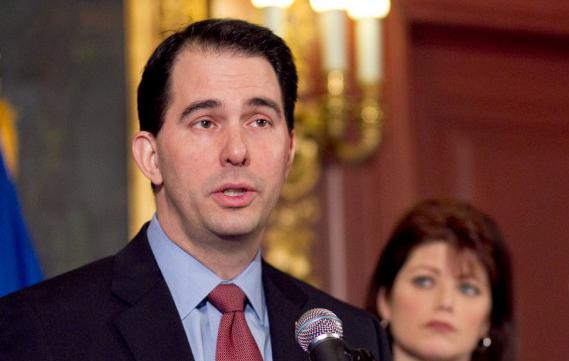Gov. Scott Walker and Democratic challenger Mary Burke clashed over several topics in their second and final gubernatorial debate Friday, which included questions on jobs, drunken driving and gun violence.
Kent Wainscott from WISN 12 asked each candidate what they would do as governor to tackle the vast unemployment, particularly of African-American men, in inner city Milwaukee in the short term.
Walker brought up the Transform Milwaukee Project, which started in April, that projected millions of dollars in investments that would create jobs in inner city Milwaukee. He said the purpose of this project was to connect people “not just with jobs, but with family supporting jobs.”
He also said he had started a task force in minority unemployment to tackle this issue, but said Milwaukee is in need of capital investments.
Burke said the state cannot have a thriving economy without a thriving Milwaukee economy. She said the Milwaukee economy has not come back from the recession at the same rate as the state or the country, and said that Walker’s term has hindered the city in getting back to pre-recession employment levels.
She said forming task forces now is not good enough, and what Milwaukee needs is investment, especially in what she called anchor institutions.
“Anchor institutions, like health care, hospitals and educational institutions that actually work with communities surrounding them to start new businesses, help them to grow those businesses and give them contracts,” she said.
Walker attacked his Democratic predecessor Jim Doyle and said much of his time in office has been spent “cleaning up the mess” from Doyle’s policies in inner city Milwaukee, policies which he said Burke supported at the time.
“[I look] forward to taking on the tough issues around education in Milwaukee because that is what is going to drive economic development and jobs in the long term,” Burke said.
Mike Strehlow of CBS 58 asked about Wisconsin’s relatively relaxed consequences for first-time drunk drivers as compared to the rest of the country, and asked if the candidates thought that Wisconsin should follow in the footsteps of other states in criminalizing drunk driving on the first offense.
Burke said she believed there are currently not enough consequences for first offenses. She also said she would work with law enforcement to cut down on the number of fatalities on the roads in Wisconsin.
“[It is] time to join the rest of the country in realizing this is something that is important to ensure safety on our roads.” Burke said. “We don’t have tough enough consequences we need to address this.”
Walker said he disagreed, but thinks Republicans and Democrats can work together on the issue.
“Criminalizing first time offenders isn’t the answer, it’s going after repeat offenders,” he said.
Ted Perry from WITI-TV Milwaukee asked about gun violence in Milwaukee and what the candidates would do decrease central city violence if elected governor.
Walker talked about the “shot spotter” program in the Milwaukee Police Department which would help law enforcement identify where shots are fired and deploy police resources even before calls are made to the police. He said he is committed to expanding the program as long as he sees continued success.
Burke said Walker’s cuts of shared revenue in certain municipalities has made it more difficult for them to provide local services that would increase safety. She also said, she’d like to see more encouragement of police working with community groups to ensure that improvements are a grassroots effort.
“We are not doing enough,” Burke said. “We have to make sure we provide adequate funding to our communities in order to fight this.”
Other issues discussed were the potential construction of a high stakes casino in Kenosha, a review of the past year’s budget, and future arena issues for the Milwaukee Bucks.













